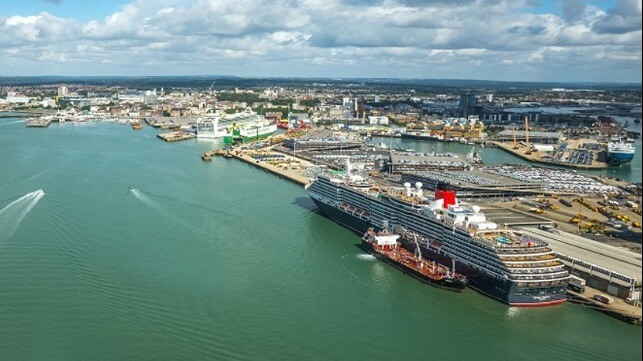UK Ports Group ABP Commits $2.4B for Net Zero Transition

The UK’s leading ports group, Associated British Ports (ABP), has unveiled an ambitious $2.4 billion green growth and sustainability plan that is designed to decarbonize operations by 2040. The organization highlights that its plan will also significantly contribute to the wider UK net zero transition goals.
ABP, which owns 21 ports around England, Wales, and Scotland including the port of Southampton, said its sustainability strategy dubbed “Ready for Tomorrow” aims to bring together projects that will deliver major greenhouse gas emission reductions and sustainability improvements for the company and its partners.
The plan involves investing $2.4 billion in green infrastructure and equipment. Specifically, $724 million will be committed to decarbonizing its infrastructure and equipment ranging from vessels and dredgers to cranes and vehicles, as well as the expansion of renewable power over the next 17 years. The company will utilize an additional $1.6 billion for infrastructure and facilities supporting customers involved in the energy transition.
ABP, which managed to reduce its carbon footprint by 38 percent between 2014 and 2021 from 70,578 tonnes of carbon dioxide equivalent (tCO2e) to 43,730 tCO2e, says that deploying the strategy to look both internally at its operations and outwardly is critical in building greater partnerships and collaborations to meet the challenges and grasp the generational opportunities of sustainability.
In the Ready for Tomorrow strategy, ABP has identified five focus areas for action. This includes net zero, air quality, biodiversity, waste, and water management. Each area has a program of action plans designed to achieve ambitious but credible targets with the ultimate goal being to reach net zero from its operations by 2040.
“Climate change is an era-defining challenge, but it is also an opportunity to scale innovative new industries to leave an optimistic legacy for generations to come,” said Henrik L. Pedersen, ABP CEO. “We are committed to working together with industry partners and authorities to turn this generational crisis into a generational opportunity, to create a decarbonized, dramatically more sustainable future and deliver the significant investment, economic growth, and thousands of new, good jobs.”
The company is a major player in the UK’s commercial shipping and logistics sector with its ports contributing $9 billion to the UK economy annually, employing 2,500 people directly, and supporting around 119,000 jobs. Annually, goods worth $180 billion pass through its ports, with the port of Southampton, which is the UK’s number one export port, handling $48.2 billion of exports for UK manufacturers every year.

that matters most
Get the latest maritime news delivered to your inbox daily.
ABP reports it is already investing in floating offshore wind, hydrogen, carbon capture and storage, industrial decarbonization, and alternative fuels projects.
The strategy embraces the fact that ports have a vital and unique enabling role for a range of major decarbonization and sustainability projects in the UK. For ABP, this includes continuing to develop its leading offshore wind manufacturing and support hubs as well as more than doubling its green power generation.
